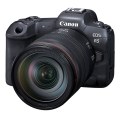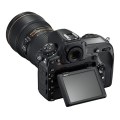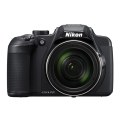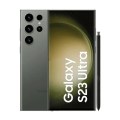- Techie Landing
- Samsung Galaxy J7 Sky Pro
- Nikon
- Canon EOS R10 DSLR Camera
Canon EOS R10 DSLR Camera
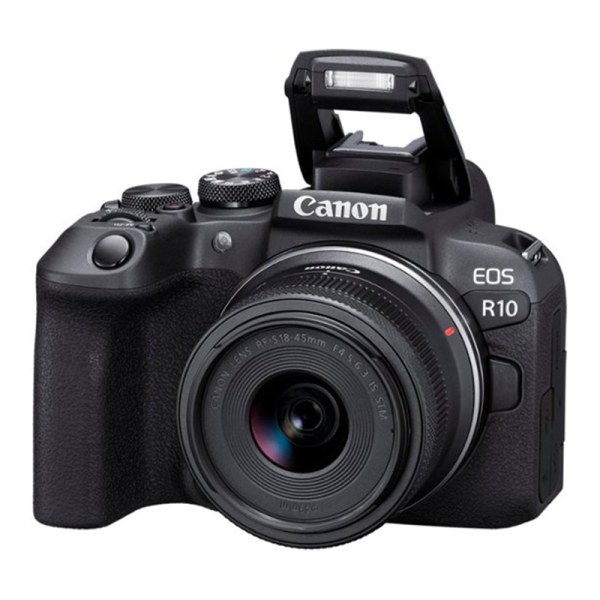










Emphasizing portability without sacrificing on capability, the Canon EOS R10 is a sleek mirrorless camera with a hybrid ethos. Adept in both photo and video worlds, the R10 brings an APS-C sensor to the R system, along with high-speed shooting, intelligent AF, and impressive 4K video recording to complement a multimedia workflow.
24.2MP APS-C CMOS Sensor and DIGIC X Processing
APS-C Comes to EOS R
Sitting at a sweet-spot in terms of resolution, the 24.2MP APS-C CMOS sensor strikes a fine balance between resolution, file size, speed, and low-light performance. This sensor is suitable for general photo tasks along with UHD 4K recording, as the file sizes are manageable enough to allow for quick continuous burst shooting and extended video recording.
DIGIC X Processor
Borrowed from the R3, the R10 sports a DIGIC X image processor to perform a variety of high-speed tasks, ranging from continuous shooting to high-resolution video recording. In terms of high-speed shooting, the R10 supports up to 23 fps continuous shooting with a silent electronic shutter or 15 fps with a mechanical shutter, with AF and AE readings before each frame. The processor also helps to realize a broad sensitivity range from ISO 100-32000, which is expandable up to ISO 51200 for working in difficult lighting conditions.
UHD 4K Video Recording
Beyond stills, the R10’s sensor also offers high-res UHD 4K 8-bit recording, with the ability to record at up to 60p using a cropped portion of the sensor or at 30p when using an oversampled 6K recording area for improved sharpness, reduced moiré, and lower noise. And, for slow-motion playback, 120p recording is supported at up to Full HD resolution.
HDR-PQ recording is possible, too, for in-camera HDR production in 10-bit and external recording, via the micro-HDMI port, which supports a clean 4K output. Also, unlimited recording times are possible, too, and the R10 features an external microphone port as well as a multi-function shoe for wide accessories compatibility.
Carried over from the EOS R3, the advanced Dual Pixel CMOS AF II system features 651 automatic AF points that covers the entire sensor area, for faster, more responsive, and more precise focusing performance. This phase-detection focusing system also has enhanced subject detection and tracking, with the ability to intelligently recognize people, animals, and vehicles and tracking will automatically lock onto these subjects and maintain sharp focus throughout burst captures. Dual Pixel AF II’s low-luminance limit focuses down to an impressive -4 EV for accurate focusing even in nighttime conditions.
Flexible Connectivity
Wired and wireless connectivity options are available, allowing for multiple methods of transferring photos and videos, as well as for remotely controlling the camera. Physically, the camera features a USB Type-C port along and a micro-HDMI port, as well as a 3.5mm microphone port to benefit video recording. In terms of wireless, 2.4GHz Wi-Fi and Bluetooth is available for transferring and remote camera control.
Specs
Dimensions
| Height | 138.5mm |
| Width | 97.5mm |
| Depth | 88mm |
| Weight | 650 grams |
DISPLAY
| Size | 3.15 inches |
FEATURES
Performance
| Water Resistant | No |
| Shock Resistant | Yes |
| Instant Print | No |
| Orientation Sensor | |
| Audio Recording | |
| Self Timer | Yes (2, 5, 10, 20 secs for up to 9 shots) |
| Shutter Speeds | 1/8000s - 30s |
Imaging
| Effective Megapixels | 24.2 megapixels |
| Optical Zoom | 5x |
| Optical Zoom Type | Automatic |
| Digital Zoom | 2x |
| Long Zoom | |
| Optical Image Stabilization | |
| Face Detection | |
| Brightness Control | |
| Burst Mode | |
| Image Resolution | 8256 x 5504 pixels |
| Image File Format(s) | JPEG, DCF 2.0, Exif 2.3, MRF, RAW, TIFF, NEF |
| Movie Mode | |
| Video Resolution | 2160p @120fps, 3840×2160 pixels |
Connectivity
| Bluetooth | Yes |
| Infrared Infrared connectivity is an old wireless technology used to connect two electronic devices. It uses a beam of infrared light to transmit information and so requires direct line of sight and operates only at close range. | |
| Wi-fi Wi-Fi is a popular wireless networking technology using radio waves to provide high-speed network connections that allows devices to communicate without cords or cables, Wi-Fi is increasingly becoming the preferred mode of internet connectivity all over the world. | Yes |
| Wi-fi Hotspot | |
| USB | USB 3.0 (5 GBit/sec) |
| GPS GPS The Global Positioning System is a satellite-based radio navigation system, GPS permits users to determine their position, velocity and the time 24 hours a day, in all weather, anywhere in the world, In order to locate your position, your device or GPS receiver must have a clear view of the sky. | No |
| NFC NFC (Near field communication) is a set of standards for smartphones and similar devices to establish peer-to-peer radio communications with each other by touching them together or bringing them into proximity, usually no more than a few inches. | |
| HDMI HDMI (High-Definition Multimedia Interface) is a compact audio/video interface for transferring uncompressed video data and compressed or uncompressed digital audio data from a HDMI-compliant source device to a compatible computer monitor, video projector, digital television, or digital audio device. | |
| Wireless Charging Wireless Charging (Inductive Charging) uses an electromagnetic field to transfer energy between two objects. This is usually done with a charging station. Energy is sent through an inductive coupling to an electrical device, which can then use that energy to charge batteries or run the device. |
Reviews
Disclaimer Note
We always try our best to keep our website content and information updated and correct, the material and information contained on our website is for general information purposes only, You should not rely upon the material and information as a basis for making any business, legal or any other decisions.




